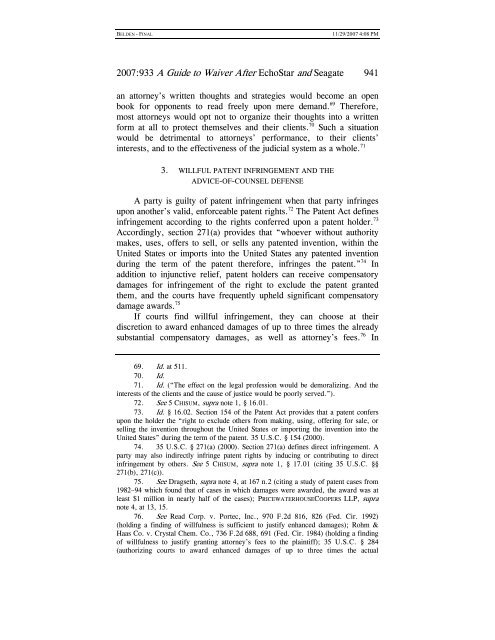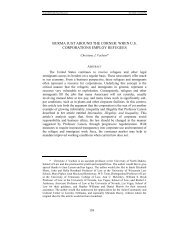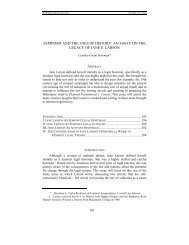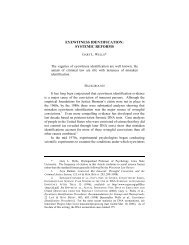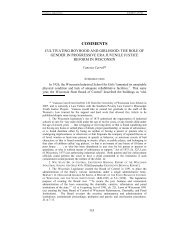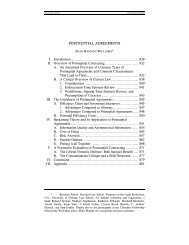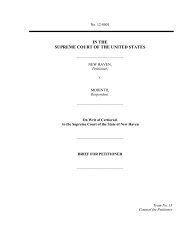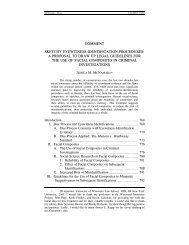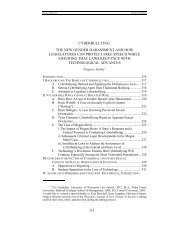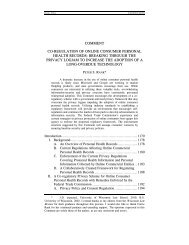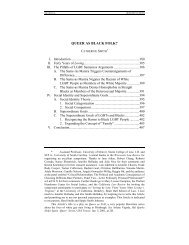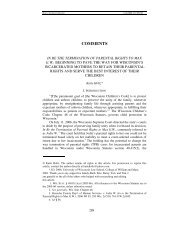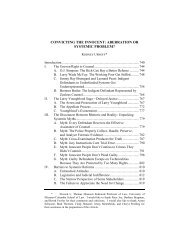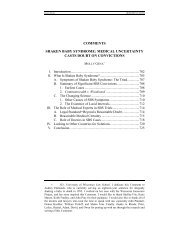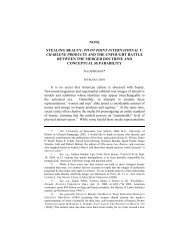note a guide to waiver after echostar and seagate - UW Law School
note a guide to waiver after echostar and seagate - UW Law School
note a guide to waiver after echostar and seagate - UW Law School
You also want an ePaper? Increase the reach of your titles
YUMPU automatically turns print PDFs into web optimized ePapers that Google loves.
BELDEN - FINAL 11/29/2007 4:08 PM<br />
2007:933 A Guide <strong>to</strong> Waiver After EchoStar <strong>and</strong> Seagate 941<br />
an at<strong>to</strong>rney’s written thoughts <strong>and</strong> strategies would become an open<br />
book for opponents <strong>to</strong> read freely upon mere dem<strong>and</strong>. 69 Therefore,<br />
most at<strong>to</strong>rneys would opt not <strong>to</strong> organize their thoughts in<strong>to</strong> a written<br />
form at all <strong>to</strong> protect themselves <strong>and</strong> their clients. 70 Such a situation<br />
would be detrimental <strong>to</strong> at<strong>to</strong>rneys’ performance, <strong>to</strong> their clients’<br />
interests, <strong>and</strong> <strong>to</strong> the effectiveness of the judicial system as a whole. 71<br />
3. WILLFUL PATENT INFRINGEMENT AND THE<br />
ADVICE-OF-COUNSEL DEFENSE<br />
A party is guilty of patent infringement when that party infringes<br />
upon another’s valid, enforceable patent rights. 72 The Patent Act defines<br />
infringement according <strong>to</strong> the rights conferred upon a patent holder. 73<br />
Accordingly, section 271(a) provides that “whoever without authority<br />
makes, uses, offers <strong>to</strong> sell, or sells any patented invention, within the<br />
United States or imports in<strong>to</strong> the United States any patented invention<br />
during the term of the patent therefore, infringes the patent.” 74 In<br />
addition <strong>to</strong> injunctive relief, patent holders can receive compensa<strong>to</strong>ry<br />
damages for infringement of the right <strong>to</strong> exclude the patent granted<br />
them, <strong>and</strong> the courts have frequently upheld significant compensa<strong>to</strong>ry<br />
damage awards. 75<br />
If courts find willful infringement, they can choose at their<br />
discretion <strong>to</strong> award enhanced damages of up <strong>to</strong> three times the already<br />
substantial compensa<strong>to</strong>ry damages, as well as at<strong>to</strong>rney’s fees. 76 In<br />
69. Id. at 511.<br />
70. Id.<br />
71. Id. (“The effect on the legal profession would be demoralizing. And the<br />
interests of the clients <strong>and</strong> the cause of justice would be poorly served.”).<br />
72. See 5 CHISUM, supra <strong>note</strong> 1, § 16.01.<br />
73. Id. § 16.02. Section 154 of the Patent Act provides that a patent confers<br />
upon the holder the “right <strong>to</strong> exclude others from making, using, offering for sale, or<br />
selling the invention throughout the United States or importing the invention in<strong>to</strong> the<br />
United States” during the term of the patent. 35 U.S.C. § 154 (2000).<br />
74. 35 U.S.C. § 271(a) (2000). Section 271(a) defines direct infringement. A<br />
party may also indirectly infringe patent rights by inducing or contributing <strong>to</strong> direct<br />
infringement by others. See 5 CHISUM, supra <strong>note</strong> 1, § 17.01 (citing 35 U.S.C. §§<br />
271(b), 271(c)).<br />
75. See Dragseth, supra <strong>note</strong> 4, at 167 n.2 (citing a study of patent cases from<br />
1982–94 which found that of cases in which damages were awarded, the award was at<br />
least $1 million in nearly half of the cases); PRICEWATERHOUSECOOPERS LLP, supra<br />
<strong>note</strong> 4, at 13, 15.<br />
76. See Read Corp. v. Portec, Inc., 970 F.2d 816, 826 (Fed. Cir. 1992)<br />
(holding a finding of willfulness is sufficient <strong>to</strong> justify enhanced damages); Rohm &<br />
Haas Co. v. Crystal Chem. Co., 736 F.2d 688, 691 (Fed. Cir. 1984) (holding a finding<br />
of willfulness <strong>to</strong> justify granting at<strong>to</strong>rney’s fees <strong>to</strong> the plaintiff); 35 U.S.C. § 284<br />
(authorizing courts <strong>to</strong> award enhanced damages of up <strong>to</strong> three times the actual


